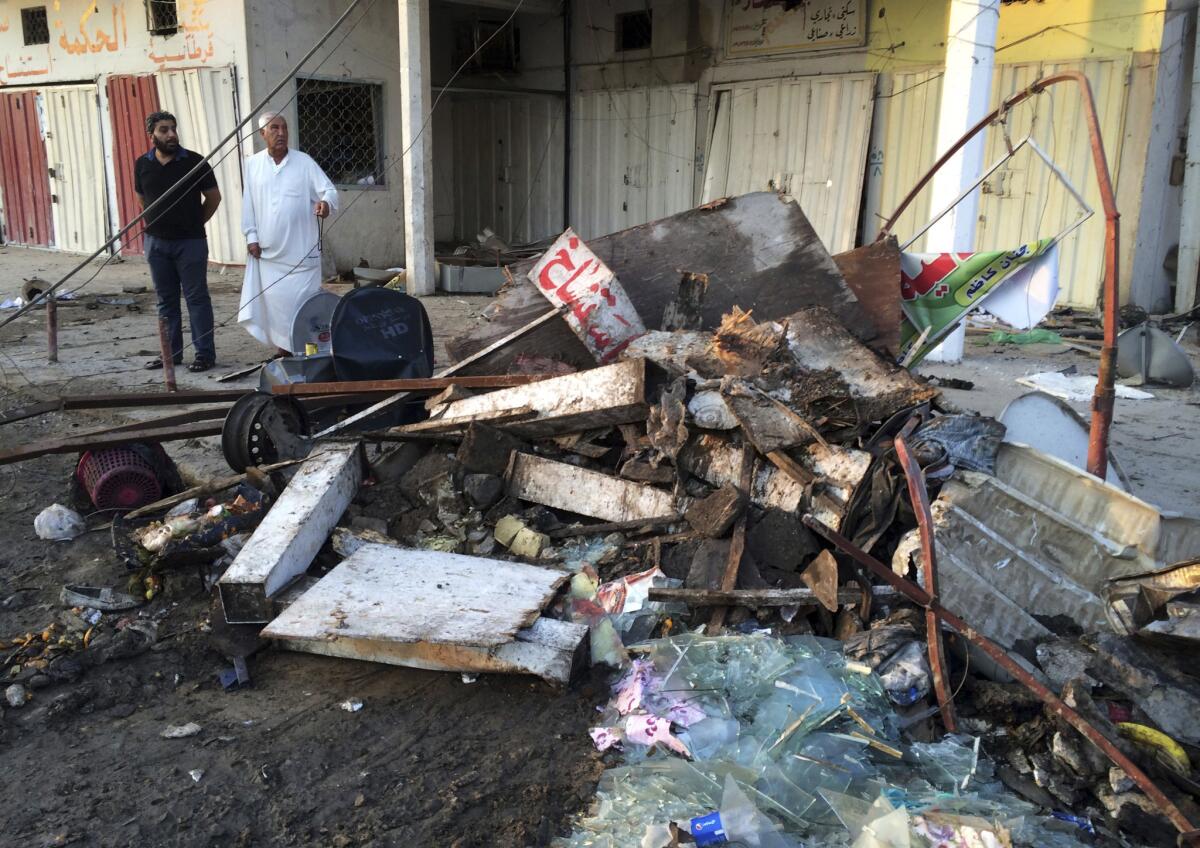Iraqi lawmakers OK Sunni, Shiite to fill 2 top Cabinet security posts

After a month of political wrangling, Iraqi’s parliament on Saturday approved Prime Minister Haider Abadi’s choices for two crucial national security ministries at a time when the country is struggling to contain an assault by Islamic State militants.
The swearing-in of a Sunni Muslim defense minister and a Shiite Muslim interior minister ended a long stalemate that had constrained the government’s response to Islamic State, which has seized control of roughly a third of the country this year.
------------
FOR THE RECORD
An earlier version of this post incorrectly spelled the last name of Iraq’s former prime minister, Nouri Maliki, as Malaki.
------------
The United States has been pressing Abadi for a more inclusive government after eight years of Shiite domination under former Prime Minister Nouri Maliki, a Shiite who held the defense and interior posts himself from 2010 until he resigned in August. The U.S. had conditioned military support on the removal of Maliki and moves by Abadi to install a unity government representing all ethnic and religious factions.
Many Sunnis, infuriated by the marginalizing of minority sects such as theirs by Maliki’s government, supported the rise of Islamic State while accusing the Shiite-dominated military of abuses against Sunnis.
The two candidates approved Saturday were not without controversy. The new interior minister, Mohammed Salem Ghabban, is a member of the Badr Corps, a Shiite political party with a powerful militia accused of torturing and killing Sunnis. Badr Corps leaders served in the interior ministry under Maliki.
Ghabban was a bitter opponent of Saddam Hussein and his Sunni-dominated Baath Party. He was jailed in 1979.
The defense minister, Khaled Obeidi, was an army officer under Hussein. He is from Mosul, a northern city that has become a symbol of the army’s incompetence and cowardice after entire units fled and abandoned their weapons while under attack by Islamic State fighters.
Obeidi was in Mosul just before the city, Iraq’s second largest, fell to Islamic State in June, Reuters reported. He was a harsh critic of Maliki’s handling of defense matters.
The nominees’ approval was an important political test for Abadi, whose previous two nominees were roundly rejected by parliament on Sept. 16. That led to weeks of political stalemate in which Abadi was forced to negotiate before submitting the two candidates Saturday.
Also Saturday, parliament approved Kurdish nominees for posts at three other ministries to complete Abadi’s 33-member Cabinet. The appointments reflected the central role of Kurds, with their seasoned peshmerga fighters, in the fight against Islamic State.
Yunadam Kana, a Christian member of parliament, said the country could not have risked waiting any longer to appoint leaders for the two crucial ministries needed to coordinate the fight against Islamic State. But he said the Abadi government has not done enough to include minorities, especially Christians.
Jamila Ubaidi, a Sunni lawmaker from Mosul, said she was so frustrated by the long delay that she had planned to boycott future sessions of parliament.
“We have cities and towns occupied by Daesh, yet we didn’t have the two ministers most responsible for the defense of the country,” Ubaidi said in a telephone interview, using the Arabic acronym for the Islamic State. “Why did we have to wait so long for this?”
Ubaidi demanded that Abadi fire several high-ranking officials in the defense and interior ministries, calling them “unprofessional.” She declined to name them.
Mahmoud Othman, a Kurd who was a member of parliament until this year, called Saturday’s appointments “a good first step.” He added in a phone interview: “But now they need to focus on fighting Daesh.”
U.S. Secretary of State John F. Kerry told reporters in Boston that the defense and interior appointments were “a very positive step forward in Iraq.’’
“These were critical positions to be filled in order to assist with the organizing effort’’ to combat Islamic State militants, Kerry said.
Follow @davidzucchino on Twitter for news out of Iraq
More to Read
Start your day right
Sign up for Essential California for news, features and recommendations from the L.A. Times and beyond in your inbox six days a week.
You may occasionally receive promotional content from the Los Angeles Times.







